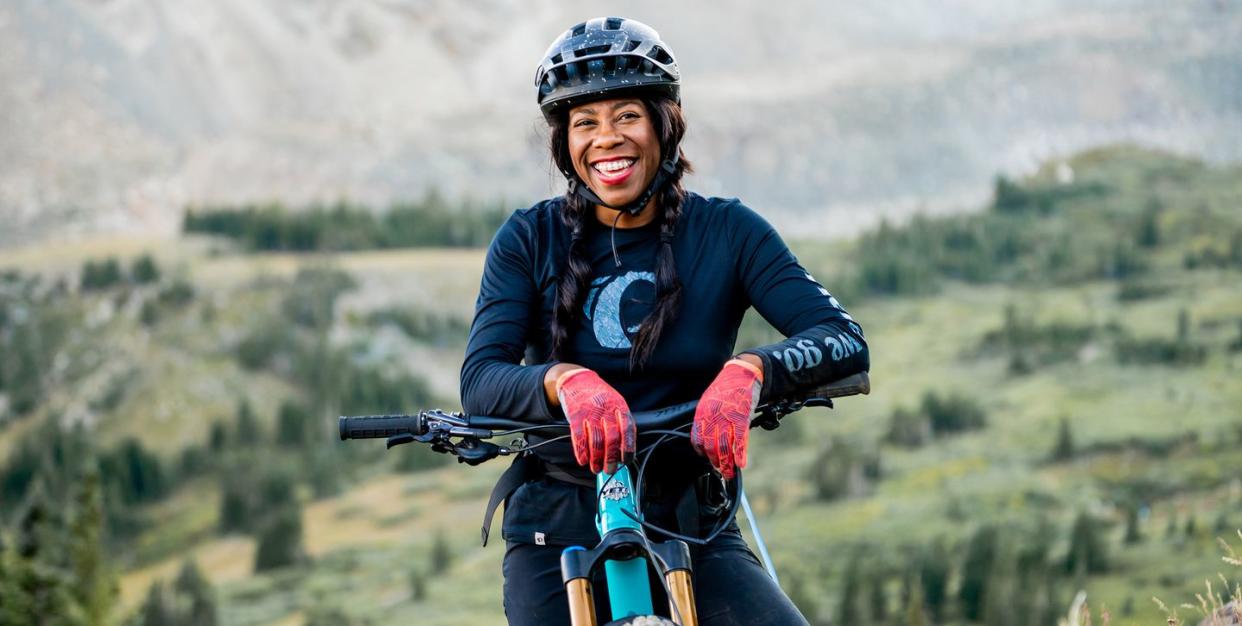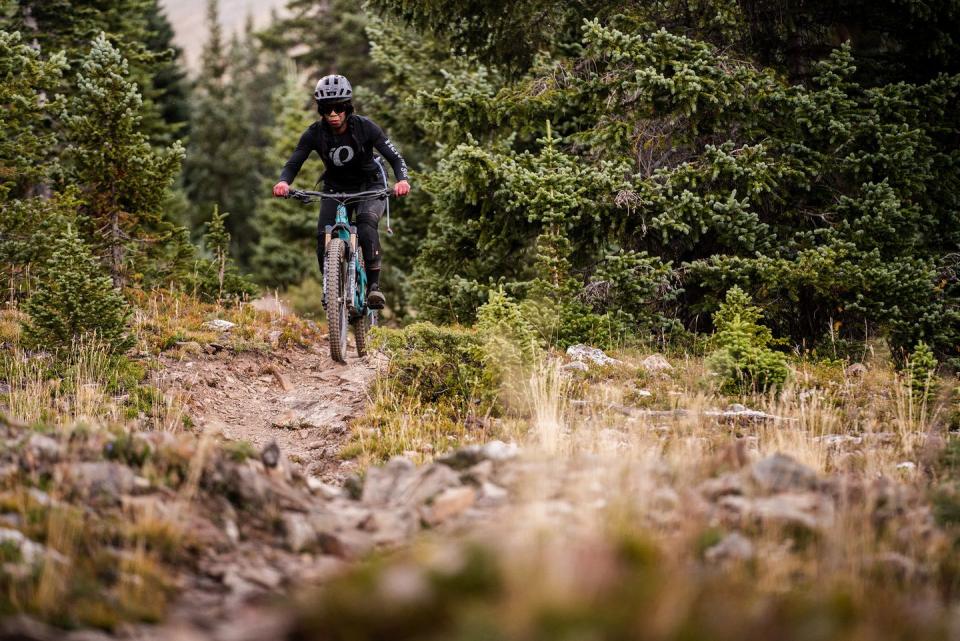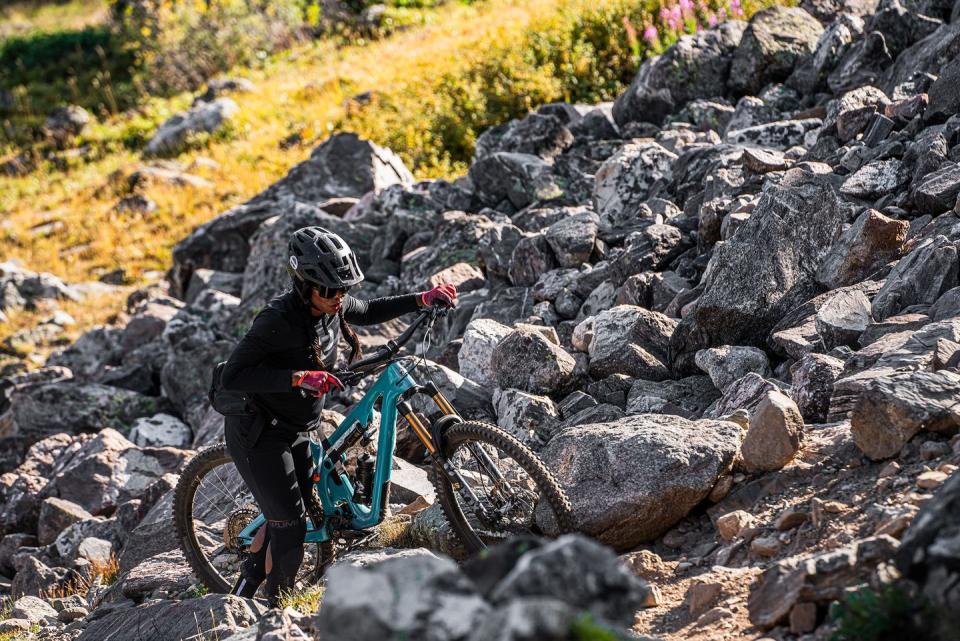This Cyclist Wants Other Black Women to Show Up to Cycle as Their Authentic Selves, Too

- Oops!Something went wrong.Please try again later.
"Hearst Magazines and Yahoo may earn commission or revenue on some items through the links below."
As a young Black girl living in Montgomery, Alabama, Brooke Goudy remembers sitting on the sofa watching Florence Griffith Joyner, more affectionately known as Flo-Jo.
An African American track and field sensation, Flo-Jo commanded attention, not only for her flamboyant style but, more notably, her speed. With her iconic one-legged tracksuit and long colorful nails, Flo-Jo won a silver medal in the 200-meters at the 1984 Olympic Games. In 1988, she won three gold medals and became “fastest woman alive” by setting the world record for the 100-meters. Her beauty and feminine athleticism transcended the track. As a successful businesswoman, she created the playbook for brand development and diversification that many female-identifying athletes use today.
Flo-Jo’s influence represented the culture that Goudy grew up in and strongly admired. After seeing Flo-Jo, Goudy recognized that there was a place for her in track and field. So she pursued the discipline in middle school and high school, where she became the Alabama State Champion in the 100- and 200-meters and long jump.
Goudy has since traded her track spikes for gravel and mountain bikes, but she’s still inspired by Flo-Jo. When she goes cycling, her kits are more than just bib and shorts; they are outfits. Her hair is always done, nails polished, impeccable make-up, and most importantly, she always wears and carries Ruby-Woo red lipstick.
Her efforts to highlight feminism in the backdrop of cycling’s overt masculinity are deliberate. When she hits the trails or gravel roads, she wants to show up as her authentic self—a feminine, Black, southern woman who is also a bit of a rebel. She wants other women to show up to cycle as their authentic selves, too, whatever that may be to them.
Falling in love with the trails
After college, Goudy moved to Denver, Colorado, for an internship to become a classical violinist and artist, but after several years of trying and with little success to show, she pivoted professionally to become a registered nurse.
Living in the mecca of outdoor adventure sports, it was only a matter of time before Goudy, a lifelong athlete, found a sport that complemented her lifestyle. She initially tried road cycling and worked to see how far and fast she could go, and the more she rode, the more she wanted to explore. Eventually, she was introduced to mountain biking by a former boyfriend, and cycling changed from a form of recreation and transportation to a way of living.

In 2021, Goudy and her partner embarked on the Great Divide Mountain Biking Route—the “longest off-pavement route” in the world, spanning 2,696 miles and 149,664 feet of elevation. Together, they were determined to complete the journey in one trip.
In preparation, Goudy took the summer off as a school nurse to ride the route at a party pace. Starting on the Alberta, Canada, border, she crisscrossed the Continental Divide through Montana, Wyoming, and New Mexico. Along the route, she had two near misses with grizzly bears—in one situation, another female cyclist riding the trail in the opposite direction was killed by one. After 60 days of cycling, her front wheel finally touched the U.S.-Mexico border.
During her two-month expedition, Goudy fell in love with bikepacking for the thrills and challenges it provided. She found that connecting with nature without a timeline allowed her the opportunity to examine herself, her life choices, and unresolved matters. Climbing thousands of feet in solitude for hours at a time allowed her mind to wander from the immediate physical challenge to her mental health. This shift gave way to much-needed healing from past trauma. The physical and mental work required throughout this journey reaffirmed Goudy’s cycling motto, “I can do hard things.”
Focusing on the present
Despite challenges, remaining present is one of Goudy’s tenets. Within weeks of completing the Great Divide, she was prepared to try her hand at gravel racing through a sponsorship from the Ride for Racial Justice nonprofit in Colorado. Goudy remembers the camaraderie she experienced with fellow cyclists of color while preparing to ride at Steamboat Gravel last year.
Reality seemed to shift as she made her way to the starting line, though. In a sea of predominantly middle-aged, white males, Goudy felt uncertain, and for the first time that weekend, she admits to feeling nervous. So much so that she shrank herself by moving to the back of the line and starting slowly.
Several miles into the race, Goudy found her footing and began focusing on her present self. As her confidence grew, Goudy found her strength, embraced the course, and exceeded her own expectations by finishing third in her age group.
Though the course was challenging, she recalls that “climbing can be as much fun as going downhill.” Reflecting on this event, Goudy vowed never to shrink herself again, even when facing uncomfortable circumstances.
Looking forward to the future

This summer, Goudy will continue pushing her limits by riding in the Westfjord Way Challenge in Westfjord, Iceland. Goudy is looking forward to racing 580 miles of gravel over four days and representing women of color along the way.
In addition to her personal cycling pursuits, Goudy’s cycling experiences and observations have also led her to take on leadership roles to make cycling more welcoming. As a coleader of the Black Girls Do Bike Denver chapter, she plans to take five women of color on a three-day bikepacking trip along the Great Divide trail in Colorado this summer. Though she would like to host more cyclists, she is highly conscious of the feasibility of bikepacking.
“Bikepacking is just as incredible as other aspects of cycling; however, the high cost of ultralight gear, durable bags, and mechanical skills presents significant barriers to entry. How do I grow a passion in women who already have so many barriers against them?” Goudy asks. She admits that this initiative will require financial, mental, and social support—all barriers she is prepared to break down so more women get the chance to experience life-changing trips on a bike.
In spite of the obvious challenges, Goudy beams as she recalls the adventure and solitude bikepacking provided her, and she wants to share that experience with these women. Maybe, just maybe, connecting with nature and not worrying about the ills of yesterday or the what-ifs of tomorrow, but rather “focusing on the present, will allow these women to connect with nature,” have new experiences, and kindle a greater love for cycling and bikepacking. (To make this trip a reality, she is currently working on fundraising, and she is happy if others would like to help her along the way.)
“Representation in the form of all bodies, colors, and abilities [in cycling] is severely lacking,” says Goudy, who is also partnering with Denver’s Mayor, Michael Hancock as a member of the Mayor’s Bicycle Advisory Committee. This group works to develop meaningful, long-term, equity-driven change in the cycling community.
Goudy will be testifying before the Colorado House Transportation and Local Government Committee in support of House Bill 22-1028 (HB22) later this month. HB22, also known as the “Safety Stop” bill, is intended to allow cyclists and people riding or occupying low-speed conveyances like electric bicycles, “one-wheels,” and electric scooters, to treat stop signs as yield signs and stop lights as stop signs. Data shows that safety stops reduce contact between cyclists, law enforcement, and motorists, which can reduce the type of interactions that often escalate and become deadly.
In addition to influencing legislation, Goudy is working to shape trails for cyclists of all abilities. She stresses that it is important for cyclists to understand where they are riding and why they can ride in certain areas, as some trails were once used for the forced removal of indigenous and Native American communities. Conversely, new trails must be built and maintained to ensure conservation and recreation. Goudy plans to coordinate a women’s trail-building retreat to empower women to participate in trail maintenance.
You Might Also Like

